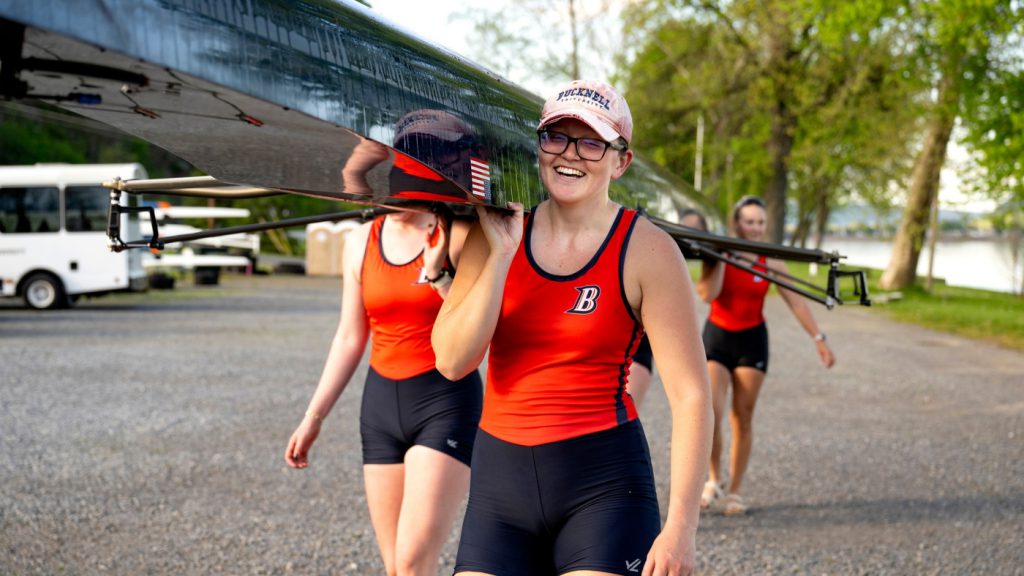Contact:
Mike Ferlazzo
570-577-3212
570-238-6266 (c)
mike.ferlazzo@bucknell.edu
LEWISBURG, Pa. (June 13, 2024) – Like a lot of high schoolers, Kona Glenn ’25 wanted to do it all in college. So when she started looking at schools, she focused on places where she could pursue an engineering degree while continuing to compete in rowing — the sport she developed a passion for while growing up on the Jersey Shore.
But when she outlined her plan to a recruiter at another school, Glenn encountered headwinds.
“They didn’t want me pursuing both rowing and engineering because they’re both such time-consuming things,” she says. “They tried to get me to consider a different major.”
Instead, Glenn considered a different school: Bucknell.
“At Bucknell, they not only said, ‘you can do it,’ they also said they have people on the rowing team who are engineers,” Glenn says. “They wanted to help you do what you wanted academically as well as athletically. They said, ‘It’s going to be tough, but it’s not impossible. You can do it here.'”
“You can do it here” applies to undergraduate research too. Glenn was told that from her first semester onward at Bucknell, she’d engage in hands-on projects with real-world impact. Sure enough, as a computer science student researcher, Glenn analyzed a massive dataset from the Pennsylvania Department of Corrections. Their goal, modeled off a similar study conducted in New York, was to look for racial biases in how inmates were treated. But there was a problem with the data: It was incredibly messy. Many of the 44,000-plus records were inconsistent or incomplete. Some lacked key demographic information about the correctional officers involved.
Using the programming language Python, which Glenn first learned in high school, she wrote code to correct inconsistencies. She used U.S. Census data to track down missing demographic info. Only then could she begin to investigate the data, mining for relationships between variables like inmate demographics, inmate behavior and the estimated demographics of correctional officers.
While the findings aren’t yet ready to be published or shared, Glenn has already seen benefits from the project. For one, she’s seen firsthand the power of computer science to unlock trends in mountains of data. With the right program, data that would take years to analyze can be searched in seconds. “It made me realize how I can use things I’m learning in class to have a real-world impact,” she says. “We can uncover bias and say, ‘this is something that needs to be addressed’ — all because I knew how to write a little thing in Python.”
Glenn hopes to turn her experiences on this project into an internship in a data science field and, ultimately, a career.
Until then, she’s relishing the Bucknell experience and proving the doubters wrong at every turn — even on the water. In 2022, Glenn’s first year, the squad was expected to finish third or fourth at the Patriot League Championships. In true “you can do it here” spirit, Glenn propelled Bucknell to a gold medal that day in the women’s eight. Glenn and her teammates beat powerhouse Boston University by more than seven seconds and earned 2022 Patriot League Boat of the Year honors.
While fans said the women were “in the zone” that day, Glenn can’t help but point out the scientific explanation for that speed. “When we’re in the boat, I’ll think about how to make the boat move faster,” she says “‘If I get my blade a certain height off the water … If I go at a certain angle …’ It’s a very scientific sport.”
Glenn’s analytical brain appreciates the problem-solving challenges of both computer engineering and rowing. If the code doesn’t work, it can be corrected. If the boat isn’t moving fast enough, that can be corrected too. “Once you do, it’s just such a cool feeling,” Glenn says. “The boat feels so light. You feel like you’re flying.”
-30-
To download full image, right-click and choose “save image as”


